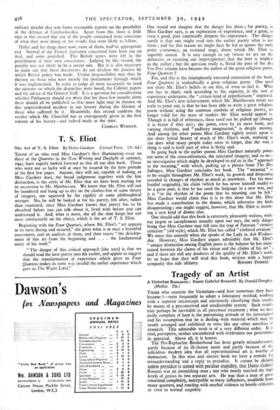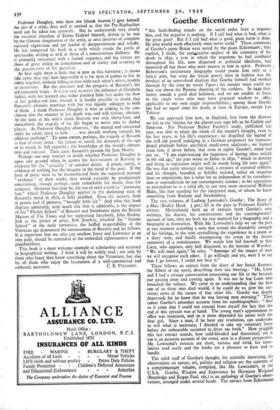Tragedy of an Artist
A Victorian Romantic : Dante Gabriel Rossetti. By Oswald Doughty. (Muller. 25s.) THOSE who examine the Victorians—and how numerous they have become —seem frequently to adopt a laboratory method, working with a superior microscope and unctuously classifying their results by means of a preconceived and unadjustable system. Such results may perhaps be inevitable in all piecemeal treatment ; what we may justly complain of here is the patronising attitude of the investigator and his assumption that he is dealing with material which may be neatly arranged and exhibited in vitro like any other novelties of research. This admirable work is of a very different order. It is vital, perceptive, neither encumbered with irrelevance nor pretentious in appraisal. Above all, it is honest.
The Pre-Raphaelite Brotherhood has been greatly misunderstood, partly because of its ill-chosen name and partly because of the ridiculous modern idea that all representational art is worthy of damnation. In this wise and sincere book we have a remedy for misunderstanding and a reply to prejudice. It cannot be denied, unless prejudice is united with peculiar stupidity, that Dante Gabriel Rossetti was an astonishing man ; one who nearly reached the high levels of genius in two separate arts. He was thus a man of great emotional complexity, susceptible to many influences, assailable from many quarters, and reacting with morbid violence to hostile criticism or even to normal stupidity.
Professor Doughty, who does not (thank heaven l) give himself the airs of a critic, does well to remind us that the Pre-Raphaelites need not be taken too seriously. But he understands very clearly the essential impulses of Dante Gabriel himself, driven as he was by the clamant imagination of the artist, at once desirous of complete outward expression and yet fearful of disappointment and rebuke. He has composed his book in a style which avoids the perils of spectacular writing as well as those of a conscientious dullness. He is primarily concerned with a factual sequence, and his virtues arc those of great ability in compilation and of clarity and accuracy in the presentation of his At first sight there is little that is new in this narrative ; it shows (die cynic may say) how impossible it is for men of genius to live in unity together, without falling in love with each other's wives, models oninistresses. But the structure and the progress of Rossetti's life are eminently tragic. It is not easy to assess the influence of Elizabeth Siddal, with her pointed and rather pinched little face under the flow of her golden-red hair, though it is hardly possible to doubt that Rossetti's ultimate marriage with her was equally unhappy to both of them. I think Professor Doughty is wise in coming to the con- clUsion that the manner of her death was, and will remain, obscure. At' thc time of his wife's death Rossetti was only thirty-four, and thenceforth the tragedy of his life began to move into its darker phases. As Professor Doughty observes, the mental and emotional strife he vainly tried to hide . . . was already working towards his ultimate undoing." To some extent, perhaps, the tragedy of Rossetti is that of every artist: the failure to satisfy lite demands of the ego or to reveal its full capacity ; the knowledge of the world's obtuse- ness and rancour. Then came Rossetti's passion for Jane Morris.
Perhaps one may venture to doubt whether Professor Doughty is upon safe ground when he quotes the love-sonnets of Rossetti as evidence for the " actuality " of satisfied desire. A poem, surely, is evidence of nothing but the imagery in the mind of the poet. If the lives of poets were to be reconstructed from the supposed internal " evidence " of their works, they would certainly be prodigiously entertaining, though perhaps more remarkable for shocks than for accuracy. However that may be, the use of such a term as " paranoiac fear," which Professor Doughty applies to the darkening state of Rossetti's mind in 1873, is fully justified. Even the success, both of poems and of pictures, " brought little joy." And what this book displays admirably, with much else that is admirable, is the impact of the "Fleshly School " of Rossetti and Swinburne upon the British Matron of The Times and her supporting busybody, John Ruskin. Jim as the prince of prigs, Bob Southey, attacked the " Satanic School " of the early romantics, the huffed respectability of the Victorian age denounced tht sensuousness of Rossetti and his fellows. It is important that we, who can swallow Joyce and Lawrence at an easy gulp, should be reminded of the embattled righteousness of our grandmothers.
This book is a most welcome example of scholarship and accuracy in biographical writing. I think it will be widely read ; not only by those who fancy they know something about the Victorians, but also by :all those who enjoy the fascination of a well-constructed and















































 Previous page
Previous page